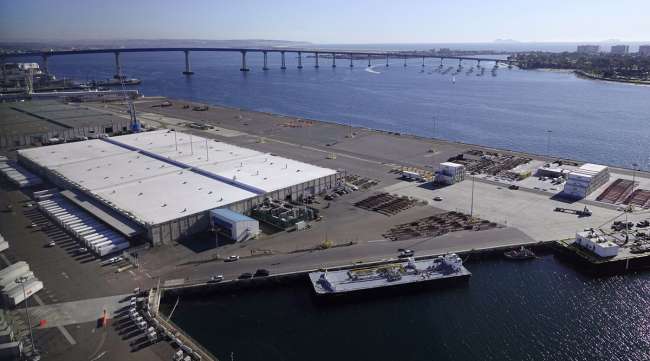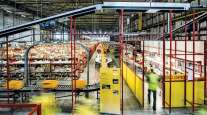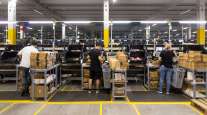Mitsubishi Warehouse Deal With Port of San Diego Falls Through

[Stay on top of transportation news: Get TTNews in your inbox.]
A deal between the Port of San Diego and Mitsubishi Cement Corp. for a storage facility at the 10th Avenue Marine Terminal has fallen through, officials announced Feb. 1.
Environmental justice advocates long opposed the project, which would have dramatically increased freight truck traffic in the neighborhood of Barrio Logan.
The port had signaled a desire to address air pollution and other concerns by requiring Mitsubishi to use electric trucks at the warehouse. However, a blueprint never materialized, and now the company appears to have abandoned its longstanding campaign. The port anticipated pulling in at least $1 million a year in lease revenue from the deal, officials said.
Rafael Castellanos, chair of the commission overseeing the port, said the situation signals a “change in culture” at the agency.
“We’re trying to be the best neighbor that we can be,” he said. “This community has historically and disproportionately suffered impacts not just from the port but by having their community dissected by an interstate and the Coronado Bridge.”
Mitsubishi had renewed its nearly decadelong push to establish a warehouse at the port last fall. The proposal had been put on hold in late 2020 after community advocates raised concerns about the potential for thousands of new diesel truck trips throughout the surrounding neighborhood.
The seven-member board of commissioners — then led by Mike Zucchet, who also works as the general manager of the San Diego Municipal Employees Association — directed the company and port staff to draft strict requirements for incorporating electric or other zero-emission trucks into the proposal.
Activists said they felt betrayed when the document never surfaced. Then Mitsubishi started blanketing the community with fliers promoting its project.

Host Seth Clevenger speaks with autonomous vehicle pioneer Don Burnette about the pros and cons of driverless cars and trucks. Hear the program above and at RoadSigns.TTNews.com.
Third of a three-part series on autonomous vehicles. Hear Part I here, and Part II here.
“Mitsubishi disrespected the community by refusing to come forward with any plans to use zero-emission trucks,” said Diane Takvorian, former executive director of the Environmental Health Coalition. “They also underestimated the strength, commitment and persistence of residents who pushed back hard, refusing to allow more deadly pollution in our communities.”
Mitsubishi did not immediately respond to a request for comment Feb. 1.
Barrio Logan has for decades been plagued by large freight trucks coming and going from the port. Massive cargo ships can also belch pollution while they unload containers using diesel-powered cranes. Such pollution contributes to fine particulate matter, known as PM2.5, which when inhaled exacerbates conditions such as asthma and heart disease. The tiny particles can lodge deep in a person’s lungs, even their bloodstream.
Barrio Logan already suffers from some of the worst asthma- and cancer-causing air pollution in the state.
Port officials have recently made some significant investments under its Maritime Clean Air Strategy. Last February, for example, the agency announced the purchase of two all-electric $14 million harbor cranes.
Officials also recently installed a second $4.6 million “shore power” project at the port’s cruise ship terminal downtown. The outlets allow ships to plug into the electrical grid while at berth, rather than running dirty diesel engines. Dole uses the same technology at the 10th Avenue Marine Terminal.
The agency also aims to launch the country’s first all-electric tugboat later this year. Traditional tugboats are a significant source of air pollution.
Castellanos said he understands why Mitsubishi struggled with the idea of an electric trucks mandate, especially given that the company’s customers use their own trucks and the technology carries a sizable startup cost.
However, he said he’s confident that there are potential tenants who will embrace the port’s ambitious vision for the future. He said he was inspired last year after visiting Europe’s largest seaport located in the Netherlands.
“They’re building full-electric terminals at the Port of Rotterdam,” he said. “If they can do it, we can certainly do it.”
Want more news? Listen to today's daily briefing below or go here for more info:
Distributed by Tribune Content Agency, LLC




